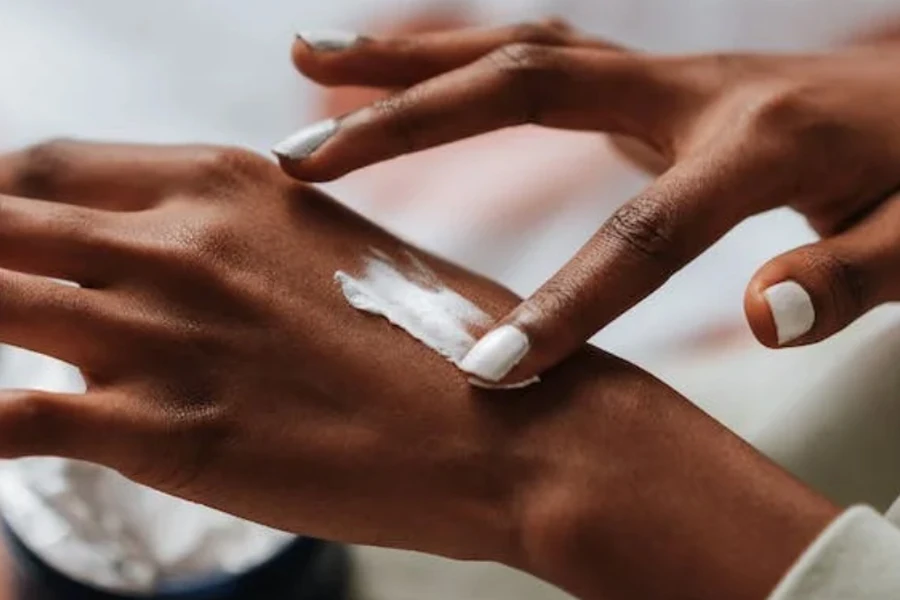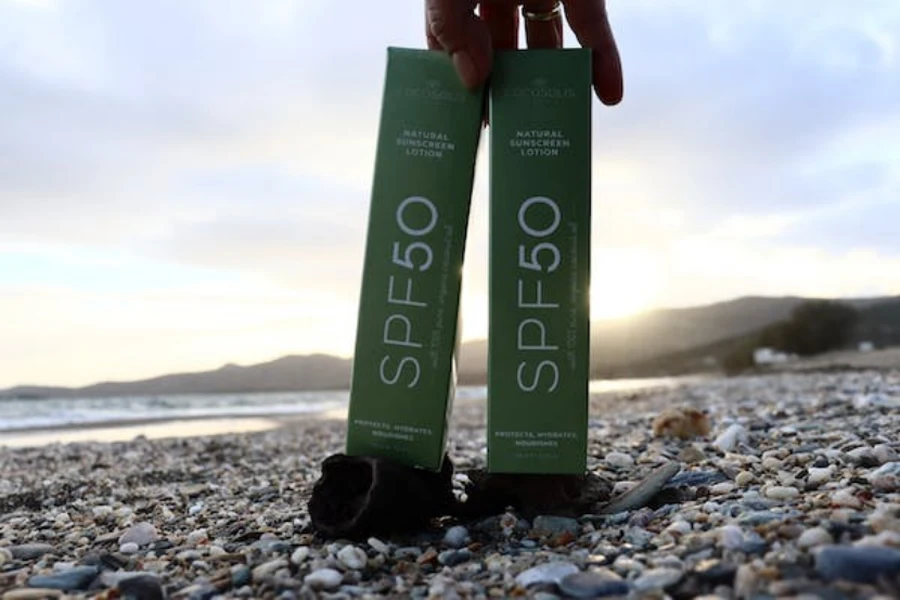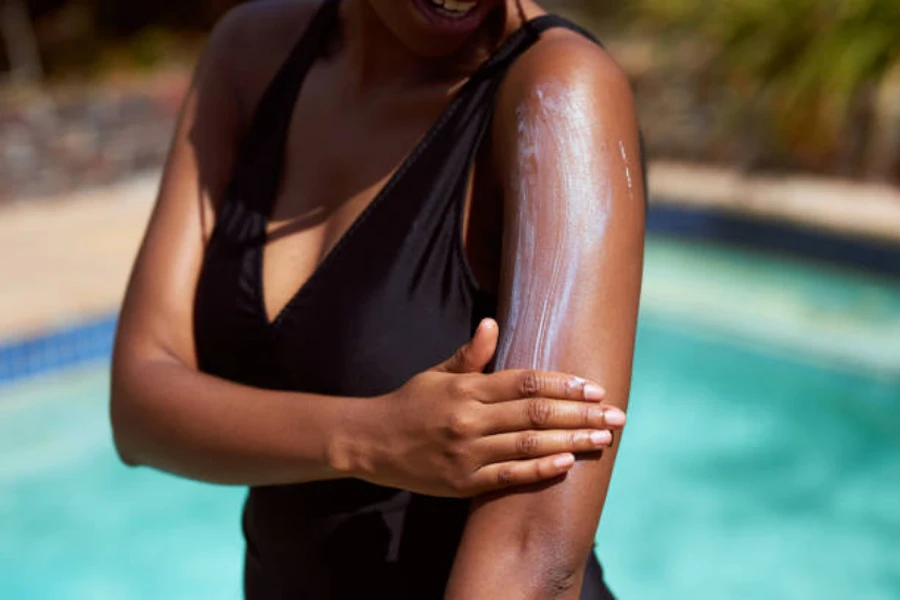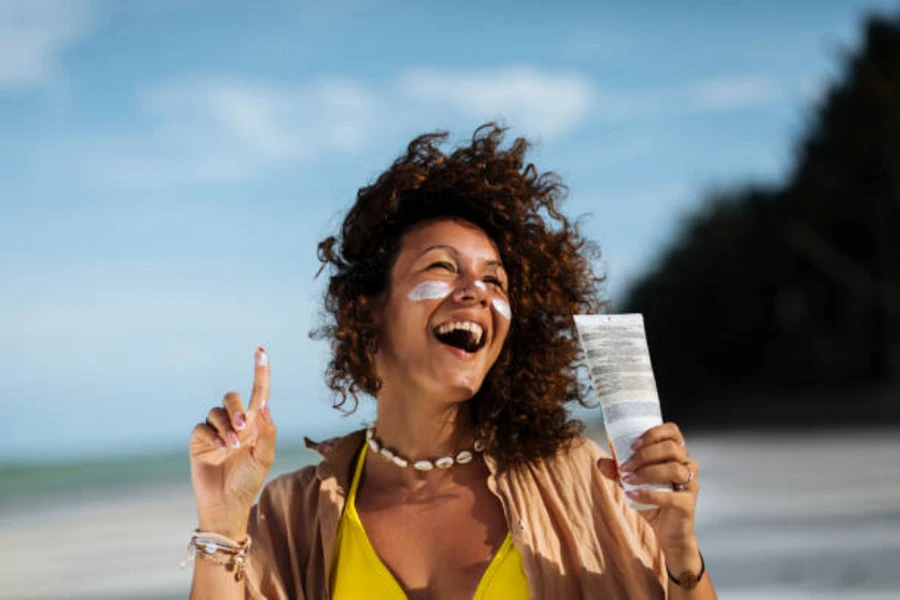Innovations in sun protection formulas and education are addressing the lack of suitable options for melanated skin. Recent developments are working to serve BIPOC consumers within the expansive suncare industry. Barriers like assumptions that darker skin requires less protection and the unwelcome white cast left behind by many products have hindered inclusion. However, small beauty brands are spearheading accessible formulations to meet this demographic’s skincare and suncare needs. Textures cater to specific concerns while ingredients provide additional benefits. Moving forward, further understanding this underserved audience will be key for brands to make lasting change.
Table of Contents:
1. Debunking myths about sun protection for darker skin
2. Solutions for removing white cast on darker skin
3. Combining sun protection and skincare
4. Celebrities championing inclusive sun care
5. Conclusion
Debunking myths about sun protection for darker skin

Prevailing myths that darker skin tones require less sun protection continue to prevent inclusion. The assumption stems from the increased protection melanin provides compared to lighter skin. However, the highest possible defense for very dark skin still only equates to SPF 13. Most experts recommend a minimum of SPF 30 daily. Though rare, skin cancer risks also exist. Those with darker skin tones are overall less likely to get skin cancer but four times more likely to receive an advanced-stage melanoma diagnosis.
Beyond risks, sunlight still causes damage like hyperpigmentation. A common refrain insists skin must visibly burn to necessitate protection. In reality, unseen genetic mutations happen with UV exposure that accumulate over time. Ultimately a lack of visible damage now does not preclude issues down the line. Everyone benefits from daily protection.
These misconceptions partially result from historical exclusion of darker skin in dermatology research and education. Many professionals admit feeling undertrained to properly treat conditions in melanated skin. Consequently, sun protection is prescribed less often. An increase in diverse voices on social media provides more representation dispelling myths. Beauty brands also share facts on protection needs for all skin tones. Debunking dated assumptions with modern research encourages more consumers to incorporate sun safety.
Solutions for removing white cast on darker skin

The white residue many sun protection products leave behind deters use, especially in deeper skin tones. Both chemical and mineral formulas can result in visible buildup. In mineral sunscreens, ingredients like zinc oxide and titanium dioxide physically deflect UV rays but show up opaque on melanin-rich skin. New innovations balance and disperse these non-nano particles to limit clumping and white cast while retaining efficacy. Chemical filters absorb rays instead, often proving easier to formulate without a cast.
When minerals or chemicals are unbalanced, light reflects unevenly off skin resulting in white buildup. Advances control dispersion and absorption to transmit light smoothly. Japanese brand Shiseido uses a chemical formula with ingredients like alcohol-free hyaluronic acid for invisibility. Fenty Skin relies on a reef-friendly chemical filter combo for a universal tint. Bliss’s mineral sunscreen incorporates fruit stem cells to create a sheer, vanishing tint.
Beyond formulas, lightweight skin care-makeup hybrids cater to women seeking protection plus complexion benefits. Multitasking tinted mineral options like Ilia’s serum skin tint even out skin tone with a dewy glow while preventing damage. Education also reduces hesitation using mineral blockers. Assuring skeptics about safety and quality through scientific explanations and clean ingredients helps conversion. Overall product adjustments and improved understanding make SPF more welcoming for excluded demographics.
Combining sun protection and skincare

Innovations go beyond basic protection to provide skin-loving ingredients that also shield from damage. Formulas tackle concerns like hyperpigmentation through added brightening components. Antioxidant and vitamin-rich additives treat existing uneven tone and discoloration while preventing future dark spots.
Catering to melanated skin in need of moisture, brands infuse hydrators like glycerin, shea butter and squalane. These moisturizing, soothing emollients defend against dryness and irritation that can increase with sun exposure. Nutrients also strengthen skin’s barrier function protecting from environmental aggressors.
Expanding beyond facial care, hair and body categories bring UV defense to scalp and locks. Formulas with UVA/UVB filters specify safety for styled textures from straight to coily. Some brands move into color cosmetics with lip glosses, serums and tints incorporating protection. Even make-up removers feature cleansing oils with SPF filters for full oversight.
This fusion of care and coverage reaches new audiences unaccustomed to daily sun defense. Making protection less clinical and more cosmetic enhances its standing as a non-negotiable step. The skincare association frames proper UVA/UVB safeguards as essential self-care rather than just medical advice. Multitasking products provide value-added skin nutrition on top of damage defense to compel consistent use. Combining care and protection makes SPF more appealing.
Celebrities championing inclusive sun care

High-profile names advocate for increased sun safety inclusion through new product ventures and open dialogue. After personal experiences struggling to find options suitable for her skin tone, model Winnie Harlow launched a line inspired by her Jamaican heritage and vitiligo condition. Her range filled a noticeable gap with items catering to overlooked concerns like unwanted white casts.
Other famous faces echo similar motivations of making protection more accessible. Tennis icon Venus Williams’ clean beauty collaboration contains reef-safe mineral filters to open sustainable options. Musician Frank Ocean’s mother, Katonya Breaux, started a brand offering mineral tints reducing the appearance of pores while moisturizing without residue.
Beyond products, public figures openly discuss the need for improved sun defense education and accessibility. Athlete Naomi Osaka’s brand spotlights the importance of protection across skin tones, keeping prices low to combat lack of access she calls “sun poverty.” Osaka uses her platform to share facts on properly caring for melanated skin to challenge assumptions.
Ultimately celebrity interest draws attention while conveying larger social messages on representation and inclusion. Household names and rising stars alike feel emboldened to speak out on holes they see in the market through new business ventures or candid commentary. Their involvement puts pressure on mainstream brands to expand offerings and helps give consumers permission to seek improved solutions.
Conclusion
The growing understanding of sun protection needs across all skin tones shows promise for increased inclusion. Recent innovations address common barriers facing melanated consumers like white casts and assumption minimization through advanced formulas and improved education. As small brands pave the way with novel hybrid products, larger players must follow suit to remain relevant. Similarly, retailers have opportunities to develop a deeper understanding of overlooked groups to provide specialty options catering to their concerns. Overall the expanding dialogue and novel solutions suggest a more equitable sun care landscape ahead.




